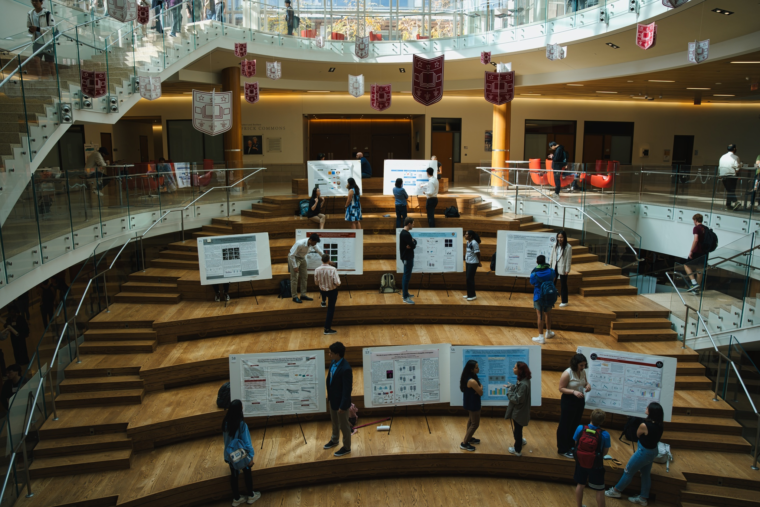Scene
Learning through experience: Undergraduates present their research at the Fall OUR Symposium
Bauer Hall was bustling with fresh ideas on Friday, Oct. 27 when undergraduate researchers set up posters and presented their work at the Office of Undergraduate Research’s Fall Symposium. There were 137 presentations in medical and medical adjacent research, 35 in the humanities, 36 in psychology, 10 in fine arts, 17 in environmental science, 16 in hard sciences, seven in economics, and two in math, according to the Office of Undergraduate Research. The goal of the symposium was to encourage undergraduate students to get involved in research and practice presenting their research to an official audience.

Courtesy of StudLife’s Photo Team.
Merrin Foltz, a senior presenting her research in the Ben-Shahar Lab, explained the focus of her project: sex-specific midline crossing in flies. She said, “[In] almost all bilateral species, neurons cross the midline of the brain, but we don’t really know why it does that.”
After putting a poster together, Foltz shared how presenting enhanced her understanding of axonal pathways. “[I] learned about [axonal pathways] in class, but I never understood what the point was,” she said. She went on to discuss how working in the lab deepened her knowledge of topics in classes, saying, “I think that being able to take that into my own hands and really isolate it is a big part of research.”
Senior Ashley Park works in the Moron-Concepcion Lab focused on neuroscience research. Specifically, she is looking at cornichon-3’s role on AMPAR subunit composition in opioid use through the BioSURF program. After presenting her poster, she explained that the “experience was very helpful in getting [her] a starting point, being able to communicate that with [her] mentor, and ask[ing] questions.” Park also noted that “by making this poster, you know where your gaps are in your knowledge,” she said.
Having worked in the lab since the second semester of her sophomore year, Park gained a lot of invaluable experience. When asked, she was excited to share advice to undergraduates interested in starting research for the first time.
“I would say really learn what field you’re interested in, what field of study you actually want to pursue, and kind of branch off of that,” Park noted. She went on to discuss a common challenge in beginning research: finding out which environment works best.
“Be flexible,” she said. “Ask around what everyone else’s experience in research labs are.”
Senior Sarah Rosen shared her unique experience in conducting historical research for her senior thesis in the department of Women, Gender, and Sexuality Studies. “I think it’s important [that] research that we do has implications for sociocultural and cultural ideology about gender, about race, about religion.”
She went on to describe the differences in how research is collected in many fields and how those can affect the way we view results. She noted, “STEM and other quantitative fields [are] very frontward-facing because it’s very tangible, and humanities research is kind of more in the abstract.”
Despite this, Rosen explained the importance of students showcasing humanities research. She pointed out its sociocultural implications and conversations around broader cultural ideologies such as the ones her own project addresses: race, gender, and religion.
Finally, Rosen touched on the significance of building relationships with professors and advisors, crediting them for how she was able to find the right resources. To those in qualitative fields, she advised, “Find resources like the Biggs award. They’re there to help students make sure that humanities research is being done and is being prioritized.”

Courtesy of StudLife’s Photo Team
For students of all areas, the symposium is a place where researchers find meaning in their work. It is also a great way to recognize progress — many student researchers at the symposium hope to expand their research into new projects, new technologies, and in some cases new legislation, according to Dr. Angela Fink, program manager of the Office of Undergraduate Research.
According to Fink, the Office of Undergraduate Research hopes the symposium will encourage first-year students to seek out research opportunities in the future. “We are trying to ramp up the opportunities for first-year students to really get engaged in and learn about the on-ramps into undergraduate research,” said Fink.
Anushka Bhat, a sophomore student researcher, said she believes the symposium highlighted the fact that research is available to everyone at WashU.
“I believe that every undergrad does have a spot in a lab,” Bhat said.
